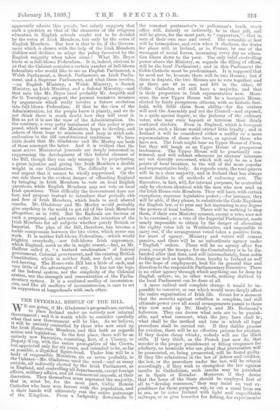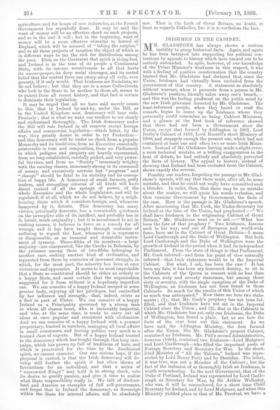THE INTERNAL RESULT OF THE BILL. W E are going, if
Mr. Gladstone's proposals are carried, to place Ireland under an entirely new internal Government; and it is worth while to consider carefully what that new Government will be like. As we believe, it will be entirely controlled by those who now send up the Irish Home-rule Members, and this both as regards action and legislation. In the first place, there will be an entirely new Executive, consisting, first, of a Viceroy, or Deputy-King, with the entire prerogative of the Crown, but appointed only for six years, and intended to be, as far as possible, a dignified figure-head. Tinder him will be a body of responsible Ministers, six or seven probably, in the Cabinet—Mr. Gladstone used the word—and as many outside, all indirectly elected by the Irish Parliament, as in England, and controlling all departments, except foreign affairs, military affairs, and all commercial imposts, at their discretion. They themselves must represent the majority, that is, must be, for the most part, Celtic Roman Catholics who have won favour with the population, and n their hands will ultimately rest the entire patronage of the Kingdom. From a Judgeship downwards to the remotest postmaster's or policeman's berth, every office will, directly or indirectly, be in their gift, a,nd will be given, for the most part, to "supporters,"—that is, men of their own race and creed. The scramble at first will be tremendous, and even when it slackens, the desire for place will, in Ireland, as in France, be one of the strongest of social forces, increasing every day as educa- tion filters down to the poor. The only valid controlling power above the Ministry, as regards the filling of offices, will be the local Parliament ; and in this Parliament the Celtic Catholic must be predominant. It is supposed that he need not be, because there will be two Houses ; but if there is dispute' the two Houses are to vote together, and as there are 48 in one, and 103 in the other' 80 Celtic Catholics will still have a majority, and that is their proportion in Irish representation now. More- over, the new Upper House will be a bourgeois House, elected by fairly prosperous citizens, with no historic foot- hold, with little claim from ability—for the orators will seek the Assembly and not the Council—and exposed, in a quite special degree, to the jealousy of the ordinary voter, who may even boycott or terrorise their thinly scattered electors. Even in England, which is bourgeois in spirit, such a House would attract little loyalty ; and in Ireland it will be considered either a nullity or a mere representation of those who have, as against those who have not. The Irish might bear an Upper House of Peers, but they will laugh at an Upper House of prosperous tradesmen. The Upper House will be practically con- temned, and will submit whenever its electors' interests are not directly concerned, which will only be on a few points of local taxation, to the will of the more popular and representative body. As regards rents, the rent-payers will be in a clear majority, and in Ireland that has always meant dislike to all methods of enforcing rent. The Executive, in fact, will, for internal purposes, be controlled only by electors identical with the men who now send up the Irish Home-rule Members. They will have, with certain exceptions, supreme legislative power ;—for instance, they will be able, if they please, to substitute the Code Napoleon for English law, or to pass any Act increasing to any degree the powers of local bodies. There will be nothing to stop them, if their own Ministry consent, except a veto, sure not to be exercised ; or a vote of the Imperial Parliament, made nearly impossible to obtain by the danger of alienating the eighty votes left in Westminster, and impossible to carry out, if the arrangement voted takes a positive form, for want of agency. Ministry and voters will remain passive, and there will be no subordinate agency under " English " orders. There will be no agency after five years, except the troops ; for the Constabulary is to be dis- banded after that time, and will intermediately, from noble feelings as well as ignoble, from loyalty to Ireland as well as the hope of employment, look for its general bias and direction to the responsible Parliamentary Executive. There is no other agency through which anything can be done by English orders ; or, in other words, nothing disliked by the local Parliament can be done at all.
A more radical and complete change it would be im- possible to conceive, or one which would more deeply affect the entire organisation of Irish life. Grant for a moment that the security against rebellion is complete, and still ultimate power over all social arrangements passes to those who now send up Mr. Healy's and Mr. Redmond's followers. They can decree what acts are to be punish- able, and what innocent, what the jury laws shall be what shall be the method and tone in which all legal procedure shall be carried out. If they dislike process for eviction, there will be no effective process for eviction. If they desire cheap whisky, nobody will see the illicit stills. If they think, as the French just now do, that murder is the proper punishment or fitting vengeance for adultery, no homicide who can plead that provocation will be prosecuted, or, being prosecuted, will be found guilty. If they like relaxations in the law of debtor and creditor, the law, or the procedure under the law, will be relaxed accordingly ; if they wish to strengthen the law against insults to Catholicism, such insults may be punished as in Spain or Ecuador. Moreover, if they desire that the force of the State should be employed first of all to "develop resources," they may insist on vast ex- penditure for those purposes, say, to cut a canal from sea to sea, or to cover Ireland with light and unprofitable railways, or to give bounties for fishing, for experimental agriculture, and for heaps of new industries, as the French Government has repeatedly done. It may be said the want of money will be an effective cheek on such projects, and so in the end it will ; but in the beginning, want of money will be a most effective stimulus to hatred of England, which will be accused of "taking the surplus," and to all tilt:58e projects of taxation the object of which is in different ways to tax the rich for distribution among the poor. Even on the Continent that spirit is rising fast, and. Ireland is in the tone of its people a Continental State, with its intense sensitiveness to all that hurts its amour-propre, its deep social cleavages, and its rooted belief that the central force can sweep away all evils, even poverty, if it only would. That Irishmen are Socialists, we do not believe ; but that they are in a sense Collectivists, who look to the State to be mother to them all, seems to us patent from all recent history, and that fact is certain to dominate their legislation. It may be urged that all we have said merely comes to this, that in Ireland by-and-by, under the Bill, as in the United Kingdom now, democracy will bear rule. Precisely ; that is what we want our readers to see clearly and understand thoroughly. The Irish democracy under the Bill will rule Ireland in all respects except foreign affairs and commercial legislation—which latter, by the way, they greatly desire in order to try Protection— and this democracy will be under no check from a popular Monarchy and its traditions, from no Executive essentially aristocratic in tone and composition, from no Parliament in which pedigree and property are heavily represented, from no long-established, carefully picked, and very power- ful Services, and from no " Society " immensely weighty with the earning classes, immensely strong in its command of money, and excessively nervous lest " progress " and "change" should be fatal to its stability and its concep- tion of happy life. A democracy of small farmers, petty traders, and struggling citizens of all kinds will have direct control of all the springs of power, of the whole Executive and the whole Legislature, and will be regulated, if at all, which we do not believe, by a neigh- bouring State which it considers foreign, and, whenever hampered by it, detests. This democracy has many virtues, principally domestic, has a remarkable quickness on the perceptive side of its intellect, and probably has in it, latent, much originality ; but it is accustomed to ad in rushing masses, it believes in force as a remedy for all wrongs, and it has been taught through centuries of suffering to regard the Law, whenever it is repressive or disagreeable, as an immoral and detestable instru- ment of tyranny. Three-fifths of its members—a large majority—are exasperated, like the Czechs in Bohemia, by the presence among them of two-fifths belonging to another race, seeking another kind of civilisation, and separated from them by centuries of incessant struggle, in which, for the most part, the minority has been at once victorious and oppressive. It seems to us most improbable that a State so constituted should be either an orderly or a happy State, and most certain that the organisation suggested for it from without is a hopelessly imperfect one. We can conceive of a happy Ireland merged in some greater body, enjoying all her privileges, but controlled by her influence and strength,—that, indeed, exists as a fact in part of Ulster. We can conceive of a happy Ireland as a Principality governed by a strong man in whom all classes trust, who is inexorably impartial, and who, at the same time, is ready to carry out all ideas at once popular and consistent with civilisation. And we can conceive of a happy Ireland with a peasant proprietary, limited in numbers, managing all local affairs in small communes, and leaving politics very much to a trained class of experts. But of a happy Ireland trusted to the democracy which has fought through this long cam- paign, which has grown up full of traditions of hate, and which is penetrated for the time by the Jacobinical spirit, we cannot conceive. Our one serious hope, if the proposal is carried, is that the Irish democracy will de- velop still further the spirit it has often shown of favouritism for an individual, and that a series of 4‘ uncrowned Kings" may hold it in strong check, veto its desire to gratify passion, and give it time to realise what State responsibility really is. We talk of Switzer- land and America as examples of full self-government, and forget that in Ireland the democracy, as Sovereign within the State for internal affairs, will be absolutely raw. That is the fault of Great Britain, no doubt, at least as regards Catholics, but it is invertheless the fact.



































 Previous page
Previous page